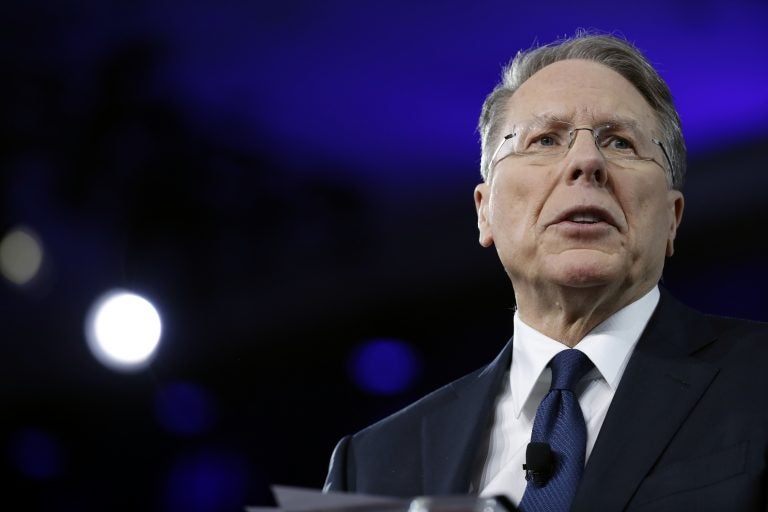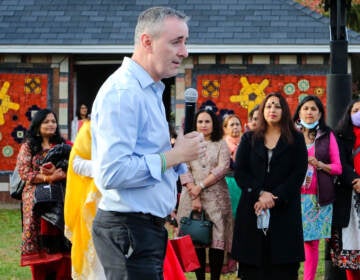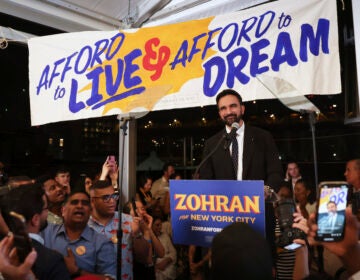Gun owners look beyond the NRA for representation
As the 2020 presidential campaign draws closer, gun control groups are seizing on the turmoil engulfing the NRA.

In this Feb. 24, 2017 file photo, National Rifle Association (NRA) Executive Vice President and Chief Executive Officer Wayne LaPierre speaks at the Conservative Political Action Conference (CPAC) in Oxon Hill, Md. Amid all the turmoil engulfing the National Rifle Association there’s one big question: Will it still be a force to be reckoned with in the 2020 presidential campaign? (Alex Brandon/AP Photo)
Bob Mokos is a passionate gun owner who on the surface would seem like a card-carrying National Rifle Association member.
The retired airline pilot has been shooting guns since he was a child. The Vietnam veteran got more serious about firearms as a civilian after one of his sisters was fatally shot during a mugging in Chicago. After the 9/11 terror attacks, he became qualified to carry a gun in the cockpit.
But Mokos has grown so disillusioned with the NRA over the years that he has joined forces with a rival organization — the gun control group founded by former Rep. Gabrielle Giffords.
“The more gun owners I contacted, the more I found out that everybody is thinking the same thing: The NRA does not speak for us,” said Mokos, who was a founder of the Minnesota Gun Owners for Safety.
As the 2020 presidential campaign draws closer, gun control groups are seizing on the turmoil engulfing the NRA — as well as recent high profile shootings in Gilroy, California; El Paso, Texas; Dayton, Ohio, and this weekend’s in Odessa and Midland, Texas — to court firearms owners in hopes of persuading them that there can be bipartisan solutions to gun violence that don’t infringe on their Second Amendment rights.
Giffords’ group formed coalitions this year with gun owners in Colorado, Minnesota and Texas in outreach that managing director Robin Lloyd said was done expressly to show that not all gun owners believe in the NRA.
“The fallacy that the NRA has perpetuated for so long is that you’re either for the Second Amendment or you’re for taking away people’s guns,” Lloyd told the AP.
At the same time, various pro-gun organizations at the state level have been more active in staking their claim as the true defenders of the Second Amendment. Many of those advocates see the NRA as too focused on raking in donations to fuel a large organization out of touch with American gun owners.
“I don’t think anybody doubts, even the most ardent critics, that they’re the biggest gun lobby on the block and probably will be still for the foreseeable future,” said Greg Pruett, president of Idaho Second Amendment Alliance. “But I think a lot of people are starting to realize … we have this large machine but it’s not doing what we’re paying it to do, so where do we turn in the meantime until they either get things cleaned up? Or is the NRA done in some regards and we’re going to suffer the consequences of their bad leadership at the ballot box?”
Long viewed as the most powerful gun lobby in the world, the NRA has been facing internal and external pressures over its operations and spending habits. Law enforcement authorities have launched probes that threaten its non-profit status and there has been a revolt by members who are questioning the NRA’s finances and leadership.
The group’s former president, Oliver North, and its longtime top lobbyist have left.
Among the headline-grabbing details are allegations that its longtime CEO, Wayne LaPierre, expensed hundreds of thousands of dollars in wardrobe purchases from a Hollywood clothier and spent thousands traveling on private jets.
The NRA’s problems have created fears among gun enthusiasts that rival organizations have found an opening to undermine the organization’s mission to protect gun rights.
“Those folks are openly saying we have to move now while the NRA is in turmoil. They are very much trying to take advantage of this,” said Tom Gresham, who hosts the syndicated radio show, “Gun Talk.”
But gun control groups trying to court politically moderate firearms enthusiasts still have a long way to go to wield the same the power of the NRA.
In the wake of massacres that killed 31 people in Texas and Ohio, LaPierre has demonstrated his sway over President Donald Trump and the Republican-led Senate, where Democratic-sponsored gun legislation faces a grim fate. Trump voiced support for universal background checks after the shootings but backtracked after a phone call with LaPierre.
The NRA spent some $30 million to help elect Trump in 2016 and remains a powerful force lobbying politicians and government officials.
In the first half of this year, the NRA spent $1.6 million lobbying Congress, the State and Justice Departments and other federal agencies on legislation that ranged from recreational shooting on federal lands to concealed firearms permits, according to disclosure records filed with the House and Senate.
The NRA donated $4.1 million to candidates for federal office during the last four election cycles, with the bulk of the contributions going to Republican incumbents, according to figures compiled by the political money website Open Secrets. That figure pales in comparison to what the gun-rights group tallies on get-out-the-vote operations and advertising campaigns.
And many gun-rights activists contend that even a weakened NRA may not matter when it comes to 2020 because the Democratic candidates for president have run so far to the left on guns during the primary. The vast majority of Democratic presidential candidates have called for a wide range of gun restrictions to be enacted.
Pruett, of the Idaho Second Amendment Alliance, said that although gun owners have grown weary of the NRA’s troubles, it won’t require much effort to mobilize gun owners because of some of the gun control ideas the Democrats have proposed during the campaign.
“The Democratic Party has gotten so radical on guns that it might actually help fuel a lot of gun owners getting out to vote and not necessarily have to rely on the NRA to get out to vote,” Pruett said. “You’d really have to be oblivious to what’s going on, and Donald Trump would be happy to remind you with every other tweet just how gun-grabbing they are.”
Alan Gottlieb is among the leaders of local Second Amendment groups that illustrate the divide between the NRA and the smaller organizations.
The longtime NRA member in 1974 formed the Second Amendment Foundation with a goal of challenging gun restrictions in the courts. It has succeeded in getting two cases before the U.S. Supreme Court but among the general public, it toils in obscurity.
“Let me put it this way: Wayne LaPierre’s salary is more than our whole total payroll,” he said.
WHYY is your source for fact-based, in-depth journalism and information. As a nonprofit organization, we rely on financial support from readers like you. Please give today.




